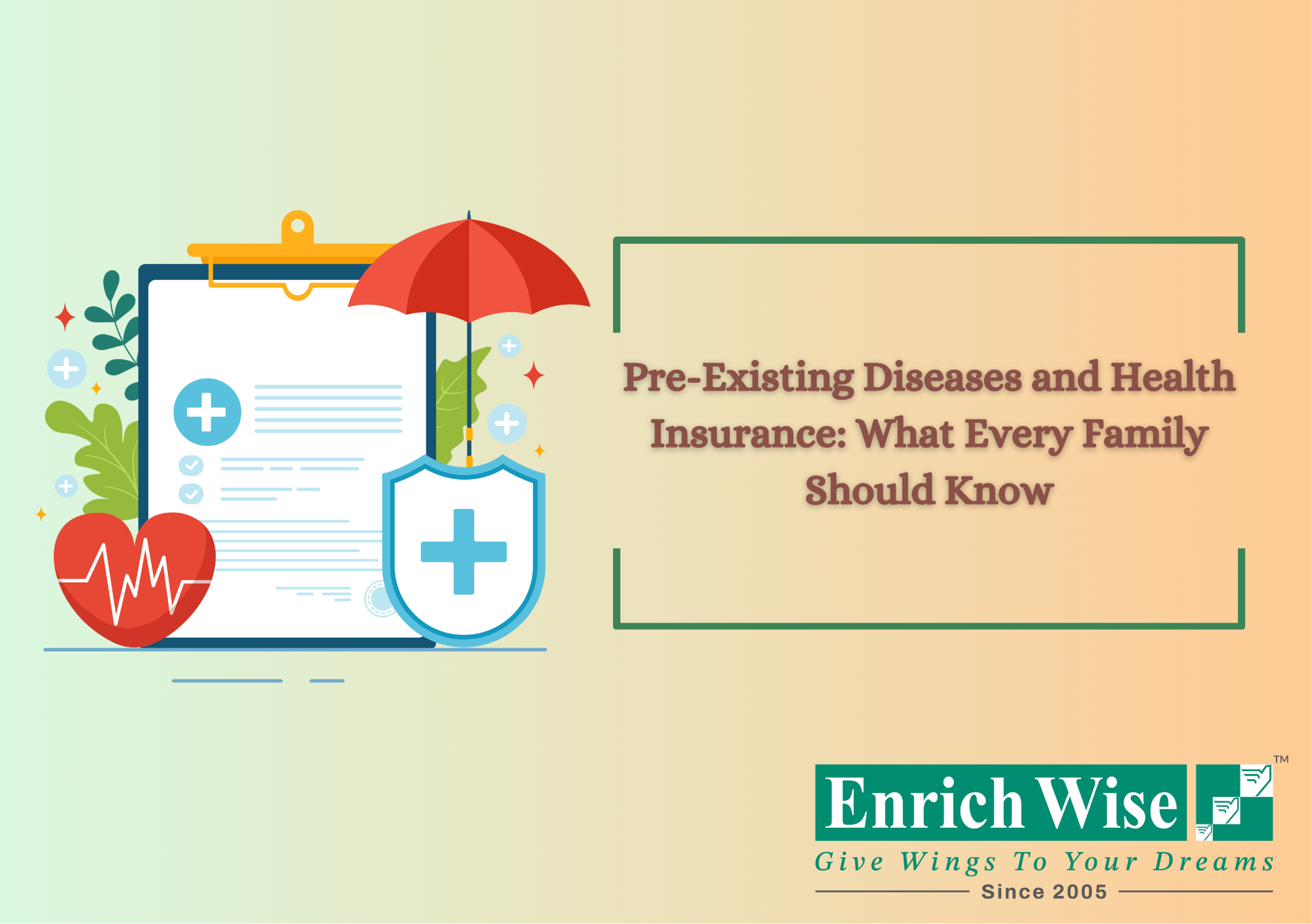Can a Pre-Existing Disease Affect Your Insurance Claim?
Imagine this: you’ve been paying your health insurance premium for years, confident that your family is covered. Then one day, a hospital bill gets rejected.
Why? Because of something called a pre-existing disease.
At Enrichwise, we’ve seen many families face this unpleasant surprise — not because they did anything wrong, but because they simply didn’t know how insurance companies treat existing health conditions.
So, if you or someone in your family already has a medical issue, this article is for you. Let’s break it down in plain English.
What Exactly Is a Pre-Existing Disease?
A pre-existing disease is any health condition you already had before buying your insurance policy.
According to the Insurance Regulatory and Development Authority of India (IRDAI), if you were diagnosed with or had symptoms of an illness within 48 months before your policy began, it counts as pre-existing.
Some common examples are:
- Diabetes or high blood pressure
- Asthma or thyroid issues
- Heart or kidney disease
- Arthritis or joint problems
- Depression, anxiety, and other mental health conditions
Does Health Insurance Cover Pre-Existing Diseases?
Yes, it does — but there’s a catch.
Most insurers cover pre-existing conditions after a waiting period, usually between 2 to 4 years.
That means if you file a claim related to your existing condition before that period ends, your insurer can legally reject it. But once the waiting period is over, your claims are fully valid.Pro Tip: If you already have a known health issue, pick a plan with the shortest possible waiting period. It might cost a little more now, but it’s worth every rupee for the peace of mind later.
Most health insurance policies include several types of waiting periods you should be aware of:
- Initial Waiting Period:
This is usually 30 days from the start of your policy. During this time, you cannot make a claim for any illness except for accidental injuries.
- Specific Illnesses Waiting Period:
Certain medical conditions such as cataract, hernia, or joint replacement come with a longer waiting period of 1 to 2 years, depending on the insurer.
- Critical Illness Cover Waiting Period:
For serious illnesses like cancer or stroke, the waiting period is typically 90 days before you can make a claim under the critical illness cover. - Maternity Benefits Waiting Period:
Coverage for pregnancy and childbirth expenses usually begins only after a waiting period of 9 months to 3 years, varying across insurance providers.
Before You Buy: Think Through These Points
Here’s what smart buyers do before signing up for a policy:
1.Compare waiting periods and coverage features.
2.Check if the plan includes OPD visits, tests, and hospitalization.
3. Read the fine print — exclusions matter more than you think.
4. Expect slightly higher premiums if you have pre-existing conditions (and that’s okay!).
A little homework now can save you a lot of financial and emotional stress later.
Medical Disclosure: Dos and Don’ts
Do:
- Always be upfront about your health history.
- Get a voluntary health check-up before applying.
Don’t:
- Hide health details to save on premium.
- Skip reading the policy terms.
It’s simple — honesty pays off. Non-disclosure might save a few thousand today but can cost you lakhs in denied claims later.
Why Full Disclosure Is Non-Negotiable
Many people hesitate to reveal their health conditions, worrying it’ll make their policy expensive. But here’s the truth — concealing information can completely void your policy.Being transparent ensures your claim stands strong when you need it most. Insurance works on trust — and that trust starts with honesty.
Enrichwise Insight
Having a pre-existing disease doesn’t mean you can’t get insured. It just means you need to plan smartly — know your waiting periods, disclose your medical history truthfully, and pick the right coverage.
At Enrichwise, we help families make confident, well-informed insurance decisions. Because at the end of the day, it’s not just about policies — it’s about your family’s peace of mind.

